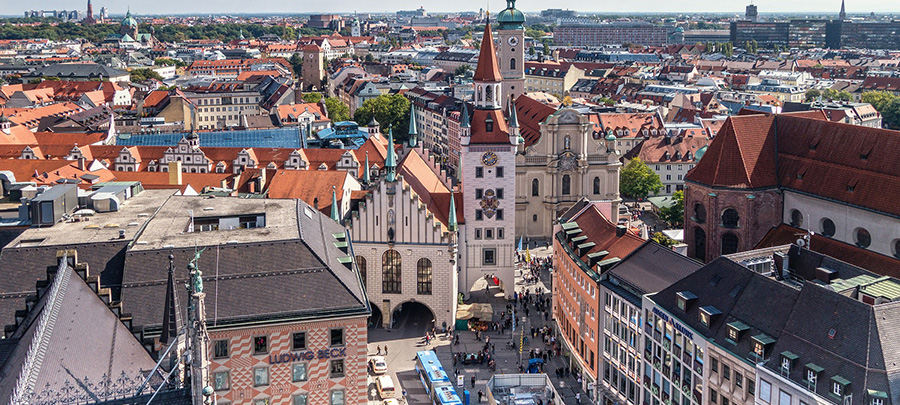

Located in the heart of Europe, Germany boasts a large population and high purchasing power, making it one of the world’s strongest economies and one of the largest wine-consuming countries. In 2023 Germany was the biggest wine importer in the world by volume, with 13.6 mhl, followed by the U.K. and the U.S.
Despite this seemingly very positive change for Germany’s wine imports, the numbers were actually slightly smaller than the previous year across almost all wine categories except bulk wine, and the country’s ascension to first place was caused by larger drops in imports in the other top wine importers.
In the United States, for example, imports by volume declined substantially to levels that were last seen in 2008. The main factors that caused this decline were a decrease in the consumers’ purchasing power, high inventory levels, and increasing overall costs – shipping, distribution, and marketing.
Another important wine importer, China, which gave a fresh breath to the industry in the last decade, reported major drops in wine imports in 2023, over 26% in volume and over 21% in value.
Not all bad news
Despite the 3% decrease compared to the previous year, sparkling wines showed a minor growth, indicating a potential shift in consumer preferences.
Italy emerged as the dominant player, accounting for over 39% of both the value and volume of imports. This trend highlights the strong presence of Italian wines in the German market. Meanwhile, France, a traditional favorite, witnessed a decline in its market share, particularly in the still wine segment. Notably, Spain and New Zealand are gaining traction amongst German consumers.
CONSUMPTION BEHAVIOUR OVERVIEW
The key to the German market is knowing the changing consumer preferences:
- German wine consumers are following global trends and despite high-volume trade, in the last few years, buyers left quantity in favor of quality that is defined by grapevine variety, origin, price and status.
- Above half of the German wine enthusiasts consume wine more frequently, at a minimum of two to three times a week while the average wine consumption per year amounts to over 20 million hectoliters.
- The frequency, quantity, and preference in origin and type of wine are influenced by education, occupation, income and age, with younger generations keener of imported wines. Red wins against white wines, men choose dry varieties, while semi-sweet and sweet wines are popular among women and younger generations.
- Occasions to enjoy wine and places of consumption are diverse, from at-home consumption to restaurants, bars or at events like wine festivals.
- Easier information access, social class, and age advancement drive German wine enthusiasts to invest time and money in acquiring wine knowledge.
- In the German market, there is a price point for every pocket, from the lower-middle segment to the premium for connoisseurs and explorers.
TRENDS
WINE
Consumers in Germany are generally trend followers, especially females and younger buyers. Currently in fashion are light whines, often low in alcohol, that suit light cuisine and consist of a more health-conscious diet, including aromatic wines, sweet wines and rose.
Sustainability and authenticity are present trends all of Europe, including Germany. Germans are careful and aware of environmental issues and seek producers and distributors that implement and improve sustainable food and drink resourcing, production and management.
Another opportunity lies in the organic boom that persists with Germany`s top position as an importer of organic wine, where German organic enthusiasts purchase regularly, particularly women, seniors, and higher earners.
Moreover, non-grape wine varieties, like apple wine or blueberry wine, grew in popularity, and are consumed especially in the winter as mulled wine, a traditional beverage during Christmas.
SPIRITS
Consumers` changing behaviour towards a healthier lifestyle resulted in mindfulness consumption, respectively lower levels of spirits sales in terms of volume. Higher-income earners, however, remain constant in buying alcoholic drinks while smaller brands dominate a great portion of sales.
Over the last few years, spirits have been gaining popularity in beer-drinking Germany, with an average per capita consumption of around 5 l and more than 50% imported spirits on the market, with high interest and growth in premium products.
BEER
Despite declining consumption, Germany is still one of the high-consumption countries internationally in the beer segment, with 43% of Germans who drink beer at least once a week. Changing consumer behaviour seems to be driven by lifestyle and health awareness among consumers, as well as a wide range of varieties available on the market.
WINE IMPORT PERSPECTIVES
Germany is a longstanding wine importer and a large wine market in Europe, with openness to import due to insufficient domestic wine production and wine enthusiasts with mature and diverse tastes. In 2023, the top ten countries of origin for wine imports were Italy, Spain, France, South Africa, Australia, Austria, Chile, United States, Hungary and Portugal.
SALES CHANNELS
Specialists retailers are the top choice for higher-priced, premium wines, while the discount sector mainly supplies the entry-level, low price segment, although it’s beginning to include high-quality, higher-priced wines too. While younger consumers purchase wine from online and discount stores, with increasing age, consumers prefer speciality stores and wineries.
Moreover, e-commerce sales of alcoholic beverages in Germany is a mature channel full of long term potential for sellers, with high internet use, and millions of consumers that shop on a daily basis. Online wine purchase and social media presence gained popularity once with a base of younger consumers.
TIPS TO ENTER THE MARKET
- Create a presence by attending wine tastings, exhibitions, fairs, and other relevant events. The largest and most popular trade show for wine and spirits in Germany is ProWein.
- Keep an eye on wine magazines and other relevant sources to stay informed on the latest trends in the market.
- Define and target your audience carefully to attract consumers and differentiate yourself from the competition by ensuring your branding is unique.
- The German large-sized market is highly competitive in terms of players and prices, but with ample opportunities for exporters to enter the market, especially in the northern part of the country.
- Focus on Value – price sensitivity remains a factor for German consumers. Wine importers offering competitive pricing strategies for quality wines will likely find success.
- Sparkling Wine Potential – the growing popularity of sparkling wines presents an opportunity for importers specializing in bubbles. Explore Prosecco, Cava, and other options beyond Champagne.
- Diversification is Key – while Italy remains strong, diversification is crucial. Wine importers with a portfolio featuring wines from Spain, New Zealand, and other emerging regions can attract a wider consumer base.
- Embrace Online Sales – the rise of e-commerce platforms presents a lucrative avenue for wine importers. Partnering with online retailers and building a strong digital presence can significantly boost sales.
Wine Importers from Germany:
Benzo Gmbh
Address: Montanstraße 25, Berlin
Phone: +49 30 40889920
Website: http://www.benzo-berlin.de/
Getränke Lorenz
Address: 37 Baubergerstraße, München
Phone: +49 89 1493670
Website: https://weinlorenz.de/
Schenk Gmbh
Address: Alemannenstr. 33, Baden-Württemberg
Phone: +49 7221 3540
Website: schenk-weine.de
Producers interested in the German market can find a database with top wine importers, distributors and retailers from Germany here.





